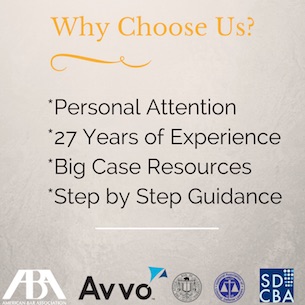Criminal Defenses: Understanding Your Options
Fighting Criminal Charges In San Diego, CA
Being charged with breaking the law is a difficult experience. If you – or someone you love – was recently arrested, you must seek help from a skilled San Diego criminal defense lawyer as soon as possible.
(619) 615-4216
Defenses Challenging The Elements Of The Crime
 One of the most effective defenses is to show that the prosecutor can’t prove every element of the crime. Your attorney may try to demonstrate that the prosecutor lacks sufficient evidence to prove your guilt. You can challenge and negate the elements of a crime if any of the following can be proven:
One of the most effective defenses is to show that the prosecutor can’t prove every element of the crime. Your attorney may try to demonstrate that the prosecutor lacks sufficient evidence to prove your guilt. You can challenge and negate the elements of a crime if any of the following can be proven:
Involuntary Acts: Criminal law does not hold individuals responsible for involuntary actions. If you acted out of reflex – while in a state of unconsciousness or during hypnosis – your lawyer may be able to prove that your actions were involuntary.
Mistake Of Fact: You can only be convicted of a crime if you were reasonably aware that your actions violated the law. If you lacked criminal intent – instead acting out of ignorance or a misunderstanding of fact – this could be a viable defense in your case. The prosecution must prove beyond a reasonable doubt that you acted with criminal intent, rather than simply making a reasonable mistake.
Impossibility: If you intended to commit a crime, but legal or factual circumstances prevented it from occurring, you may be able to raise the impossibility defense. The underlying rationale behind this defense is that attempting to do something that is not illegal cannot be considered an attempt to commit a crime.
Abandonment Or Withdrawal: Also referred to as renunciation, this is the voluntary abandonment of plans to commit a crime. This defense does not include situations where you withdrew from committing the crime merely because you were afraid of getting caught, decided to postpone the crime, or sought a different victim.
Justification Defenses
If it has already been established that you have committed a crime, your attorney may still be able to assert an affirmative defense. If it can be proven that you acted appropriately in a difficult situation, your actions may be considered justifiable. Some of the most frequently-used justification defenses include:
Self-defense: A claim of self-defense is based upon the notion that the use of force was necessary for the protection of oneself. If you were reasonably fearful of serious bodily injury or death, you would be justified in using equal force to protect yourself. Your likelihood of mounting a successful defense depends on a large number of parameters related to both the severity of the threat, and the mental and physical preparedness of the defendant.
Defense Of Others: This is related to the theory of self-defense, with the only difference being that you were defending someone else. If someone has been threatened with imminent violence, or is being attacked, you would be justified in using force to protect them. To use this defense, you must have believed that the victim had the right to self-defense when threatened or attacked.
Defense Of Property: The defense of property is a common method of justification used by defendants who argue that they shouldn’t be liable for any loss or injury they have inflicted upon others in defense of their property. Under California law, a person is allowed to use limited force to protect his property, though the use of deadly force is not defensible.
Law Enforcement Defense: Law enforcement officers – and individuals acting on their behalf – are justified in the use of force to apprehend suspects and defend themselves. If a suspect threatens a police officer’s life, the officer is justified in the use of deadly force to protect himself.
Necessity: Those relying on this defense argue that they shouldn’t be held liable for their actions because their conduct was necessary in order to prevent a greater harm. To use this defense, four conditions must be met: You faced a “choice of evils”; there was no obvious legal alternative; there was an immediate threat; and you chose the lesser harm.
Defenses That May Excuse Your Actions
Under California law, a defendant can excuse their actions if they can demonstrate that they made a socially unacceptable choice due to the fact that they are incapable of controlling their behavior, or they do not understand the consequences of their actions. These are called “excuse defenses,” and can be used under a variety of circumstances:
Duress: If a threat – or actual use – of physical force drove you to commit a crime, you may be able to use the defense of duress. This defense generally has three elements: You faced an immediate threat of death or serious bodily injury; you had a well-grounded fear that this threat would be carried out; and you lacked a reasonable opportunity to escape without committing the act.
Involuntary Intoxication: If someone forced drugs or alcohol upon you, or tricked you into consuming them, you may be entitled to use this defense. It can only be asserted if you are guilty of a crime that you would not have committed had you been sober.
Insanity: If a mental disorder prevented the defendant from knowing that their actions were wrong or against the law, they may be able to protect themselves against criminal conviction by utilizing the insanity defense. This is based upon evaluations by forensic mental health professionals, and provides a full defense against criminal charges.
Entrapment: This is the practice whereby a law enforcement agent induces a person to commit a criminal offense that he would otherwise have been unlikely to commit. To use this defense, you need to prove that you would not have committed the crime without this undue influence.
Infancy: The law excuses the acts of children under the age of seven, since they are too young to understand the consequences of their actions. Minors between the ages of seven and fourteen are presumed to be incapable of committing a crime.
Contact The Law Office Of Gregory Garrison To Discuss Your Options
Serious charges demand a serious defense, and we understand what it takes to win a difficult case. If you were recently charged with a crime in San Diego, CA, you need experienced representation fighting to protect you against the consequences of a conviction. With over 32 years of combined legal experience, we can explain your defense options. Get the help you need by contacting the Law Office of Gregory Garrison for a free, confidential consultation with our firm.

